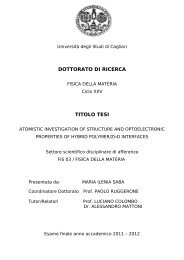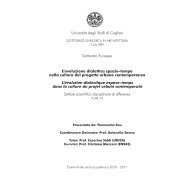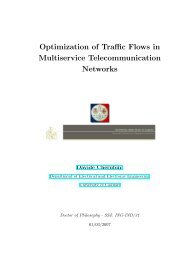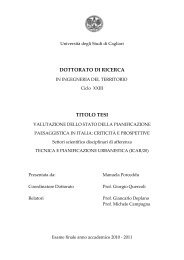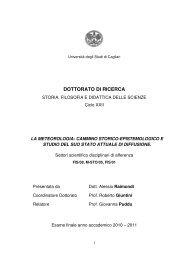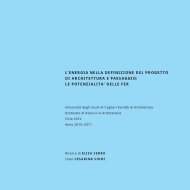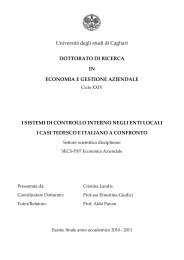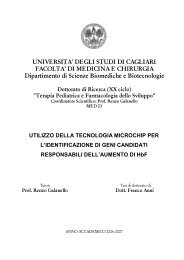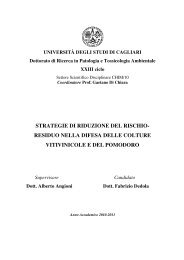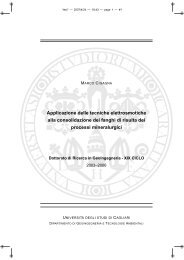The only truly alien planet is Earth. - UniCA Eprints - Università degli ...
The only truly alien planet is Earth. - UniCA Eprints - Università degli ...
The only truly alien planet is Earth. - UniCA Eprints - Università degli ...
Create successful ePaper yourself
Turn your PDF publications into a flip-book with our unique Google optimized e-Paper software.
Proprio Michael Moorcock, in un articolo del 1971 sul quotidiano <strong>The</strong> Guardian, defin<strong>is</strong>ce<br />
in maniera efficace ciò che d<strong>is</strong>tingue un autore di genere da un autore che si muove più liberamente,<br />
prescindendo dai confini tra generi:<br />
<strong>The</strong>re has always been a difference between the SF author and the author who writes science fiction;<br />
the difference, say, between an Isaac Asimov and a George Orwell. […] When these writers [della ‘new<br />
wave’] still produce SF it <strong>is</strong> because they're moved by the same spirit which produced Wells’ Time Machine,<br />
Huxley’s Brave New World, Orwell’s 1984; they happen to find certain SF elements useful for expressing<br />
their particular moral concerns. <strong>The</strong>se writers include Brian Ald<strong>is</strong>s, J. G. Ballard, Langdon Jones and<br />
Americans like Thomas D<strong>is</strong>ch and Harvey Jacobs. Of late, and with similar moral intention, Jack Trevor<br />
Story has started to write SF, as have writers like Paul Ableman and Dor<strong>is</strong> Lessing. <strong>The</strong> difference <strong>is</strong><br />
between a writer who uses an SF idea and one who writes SF because he can't easily do anything else 7 .<br />
Pertanto fin dall’inizio Ballard si situa come ‘eretico’ all’interno della science fiction<br />
tradizionale, tanto più se si considera quanto fosse orientata alla conservazione la maggior parte dei<br />
fans. Si potrebbe dire che Ballard sta a Asimov come Jung sta a Freud 8 .<br />
Considerato tutto ciò, si può affermare che la produzione di Ballard, come quella di tutti i<br />
grandi scrittori, costitu<strong>is</strong>ce un universo narrativo a se stante, che ha sì dei punti di contatto con<br />
diversi generi e anche con altri autori, ma che rimane sempre inconfondibilmente se stesso, un<br />
unicum nel panorama letterario. È un autore dalle diverse sfaccettature, collocabile, come sostiene<br />
acutamente Roger Luckhurst rifacendosi al concetto derridiano di br<strong>is</strong>ure, al margine che separa i<br />
due termini di diverse coppie oppositive, science fiction/mainstream, highbrow/lowbrow,<br />
modern/postmodern. Per la prec<strong>is</strong>ione, trova la sua collocazione esattamente in <strong>The</strong> Angle Between<br />
Two Walls. Ad esempio, nei quattro romanzi sulla catastrofe, si può dire che lo spazio della<br />
narrazione si situi in mezzo ai d<strong>is</strong>astri descritti 9 . La sua atipicità è dunque anche il suo marchio di<br />
fabbrica, la caratter<strong>is</strong>tica che fa di lui uno scrittore unico, come tutti i grandi autori. Il suo<br />
polimorf<strong>is</strong>mo lo ha portato a convergere di volta in volta su generi e topoi differenti, ma sempre<br />
nell’ambito di una costante coerenza di fondo, la stessa che ha portato a coniare il neolog<strong>is</strong>mo<br />
‘ballardiano’, come ricordato in apertura. Le possibili considerazioni sul suo stile di scrittura,<br />
secondo alcuni non particolarmente elegante e talvolta perfino un po’ goffo 10 , eppure sempre<br />
coinvolgente, passano dec<strong>is</strong>amente in secondo piano davanti al ‘ballardian<strong>is</strong>mo’ di Ballard, la sua<br />
cifra autoriale inconfondibile. Talmente tale che c’è stato anche qualche tentativo di scrivere<br />
racconti ‘ballardiani’ apocrifi 11 . Harlan Ell<strong>is</strong>on afferma:<br />
7 Michael Moorcock, “What does the future hold for science fiction?”, <strong>The</strong> Guardian, 16/09/1971.<br />
8 «If Ballard <strong>is</strong> ‘unacceptable’ to science fiction, then Jung has always been ‘unacceptable’ to more dominantly<br />
Freudian conception of the unconscious.» R. Luckhurst, op. cit. (1997), p. 51.<br />
9 «[…] [W]hat impels th<strong>is</strong> labour of interpretation <strong>is</strong> the enigma of the interval, the peculiar space of the texts, as taking<br />
place between catastrophes [corsivo dell’autore].” Ivi, p. 72.<br />
10 «Pra<strong>is</strong>e <strong>is</strong> mixed with comments on the awkwardness of h<strong>is</strong> prose […].» Ivi, p. 153.<br />
11 Per esempio “Il silenzio <strong>degli</strong> occhi” e “Ultime notizie” di Daniele Brolli, apparsi per la prima volta r<strong>is</strong>pettivamente<br />
sulle riv<strong>is</strong>te Frigidaire (agosto 1987) e Cyborg (marzo 191), poi compresi nella raccolta Segrete identità. Questi<br />
- 4 -



